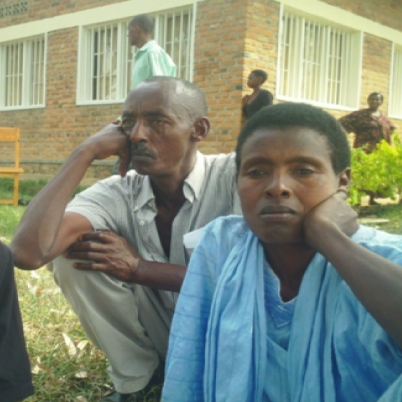
A guest post from Albert Gasake, Legal Advocacy Project Coordinator of Survivors Fund (SURF) in Rwanda:
Right to reparation for survivors of the 1994 Tutsi genocide in Rwanda: Difficulties and future perspectives
While the rights to reparation for victims of genocide, war crimes and crimes against humanity continue to positively evolve in international law, the 309,000 survivors of the 1994 genocide committed against Tutsi in Rwanda still face several legal difficulties to secure reparations for crimes committed during the genocide. Eighteen years on from the genocide, these survivors have yet to receive effective or adequate reparation, remedy or redress which is their right under international law.
The reparation verdict delivered by the International Criminal Court (ICC) on 14th August 2012 in the case of Thomas Lubanga, marked a milestone development in the international criminal law and serves as a precedent for the establishment of a framework for reparation to victims of international humanitarian law violations. In Rwanda, following the closure of gacaca, all outstanding cases that fell within the competence of these grassroots courts shall now be referred to ordinary classic courts. However, there are numerous inconsistencies in how compensation procedure is initiated and determined for the crimes of genocide, war crimes and crimes against humanity committed in Rwanda.
In the midst of this uncertainty, the judiciary in Rwanda should follow the example of the ICC’s reparation principles to ensure that meaningful and effective reparation principles relating to genocide cases are set out to address several ambiguities that surround reparation proceedings currently before Rwanda’s courts.
Currently a number of laws and ongoing draft laws deliberately limit survivors’ right to reparation for victims and hinder its probable application even in the future. In April 2012, IBUKA, the national umbrella association of survivor’s organisations in Rwanda, submitted a response to the then draft Organic Law terminating gacaca, calling on the Government of Rwanda to incorporate within that law the right of genocide survivors to reparation. Last month, IBUKA submitted a further response to the Draft Presidential Order determining the modalities of implementation of Community Service (TIG) as an alternative penalty to imprisonment, which is the implementation instruction of the Organic Law.
Not only did the legislation fail to protect the right of survivors to reparation, instead it infringed on their right to do so, namely to claim restitution or compensation for looted or damaged property from insolvent perpetrators in cases where they become solvent.
Over the ten years of gacaca, restitution of property looted and pillaged during the 1994 genocide was the only tangible form of reparation available to survivors. Tens of thousands of restitution awards were made to survivors. However, as is also the case with the 4,000 reparation awards made by specialised chambers since 1996, most awards have not been enforced.
Persistent failure to enforce awards of court and gacaca judgments has a significant adverse impact upon survivors’ lives, as well as on survivors’ perceptions of justice processes initiated by the Government of Rwanda, third countries and the UN (“international community”). To date:
– Survivors interviewed by SURF and REDRESS unanimously state that justice has not been served, as it has not included compensation.
– Interviews and seminars organised by survivor’s organisations in collaboration with SURF and REDRESS suggest that the inadequate responses to calls for compensation and restitution slows down, even hampers, progress towards reconciliation;
– Survivors have expressed their fear that their right to compensation will never be addressed, especially now that gacaca is closing down and that the ICTR is coming to an end.
Given the specific nature and scale of the 1994 genocide, in which hundreds of thousands of ordinary and often poor civilians actively participated in the killing of Tutsi and the destruction of property, coupled with the large number of survivors, a comprehensive reparations mechanism set up by the government would be the most effective means of realising the right of survivors to reparation. However, to date this has failed to materialise due to a lack of political will, alleged limited funding and a narrow awareness of the reparation beyond assistance to only the most vulnerable survivors through FARG (Government Assistance Fund for Vulnerable Survivors).
The majority of survivors’ organisations consulted by SURF and REDRESS indicated that they believe the Government is primarily responsible for ensuring reparation. For them, a Compensation Fund is still the best option for delivering compensation and restitution to survivors, provided that survivors and survivors’ organisations in Rwanda are consulted in its establishment and formally represented in its governance (addressing the exclusion of survivor’s organisations from the management of FARG). Such a Compensation Fund will address the lack of enforcement of compensation awards, and help survivors to address the most serious consequences of the genocide.
Since 2010, REDRESS and Survivors Fund (SURF), in conjunction with IBUKA, have conducted research countries into possible mechanisms to deliver reparations to genocide survivors in Rwanda, out of which a discussion paper was published in July 2012, No Justice Without Reparation. It incorporates the views of survivors, and draws on the experience of other post-conflict countries, as to how best the issue of reparation can be addressed. The main recommendation calls on the Government of Rwanda to establish a Task Force on Reparations with the necessary resources to undertake a comprehensive assessment of the situation for a report that will serve as a roadmap for the Government of Rwanda to finally address the issue.
